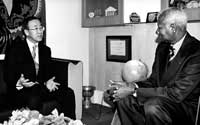
| Ban ki-Moon put on notice NEW YORK - Perhaps in hindsight Jayantha Dhanapala should be happy he is not the next Secretary-General of the United Nations — notwithstanding the fact that he ran an unblemished campaign and never attempted to "buy" votes or "stuff" ballot boxes (as most Sri Lankan politicians are adept at). The Wall Street Journal, a vociferously right wing newspaper that has routinely hounded the current Secretary-General Kofi Annan, last week took a passing shot at his newly-anointed successor Ban ki-Moon, the outgoing Foreign Minister of South Korea. Commenting on the latest corruption scandal at the UN, the Journal editorial said: "It would be nice to think we can expect better from Mr. Ban."
But the newspaper, which has strong ideological links to the Bush administration, also put the new Secretary-General on notice, even before he could take office next January. "But it is telling that the South Korean Foreign Minister helped secure his new post with blandishments and pledges of aid to some of the Security Council countries that voted on him." In a corruption plagued institution, the charges were akin to a time-bomb set to explode much later. The London Times has already elaborated on these charges which the South Koreans have vehemently denied. In an age of public accountability and good governance, all senior UN officials, including the Secretary-General, have to be squeaky clean — or appear to be one. Otherwise, their political past will come back to haunt them — particularly if they stand up to the big powers and tell them where to get off. The bottom line for any UN Secretary-General is clear: if you don't play ball with the US, you are a dead man walking. Annan learnt it the hard way when he told a BBC interviewer that the US-led war in Iraq was "illegal" because it did not have the blessings of the Security Council. The right wing neo conservatives, the strongest supporters of the Bush administration, hounded Annan — and will continue to hound him until December 31 when he steps down after a 10 year tenure. Last week's warning from the Wall Street Journal is ominous because it gives the impression it already has the "dirt" on the new Secretary-General. If he is not vulnerable to manipulation by the US and refuses to cave in to the White House, the right wingers will surely go after him — as they did Annan. Former Under-Secretary-General Gamani Corea remarked more than a decade ago that he didn’t know why anyone in his right mind would want the job of Secretary-General. But more than 10 years later, the situation has changed for the worse. In today's political climate, every Secretary-General will have to virtually live in a fishbowl. Every move, every action will be politically scrutinized, and at times with ulterior motives. The Journal — specifically its editorial page — fired another shot at Annan last week over the continued scandal of UN corruption. The latest expose is the indictment of a UN procurement official from India, Sanjay Bahel (no relative of Sanjay Kumar, the Sri Lankan ex-chief executive officer of Computer Associates, who was sentenced last week to 12 years in federal prison for accounting fraud). Bahel is accused of diverting some $50 million in contracts to an Indian company. An act of misguided patriotism? Or a payback for a cut price apartment in New York city? The investigators are probing a litany of charges. Annan, whose office is cooperating with US law enforcement officials, has already lifted Bahel's diplomatic immunity. But every new case of corruption, waste, mismanagement and fraud is occasion to hang Annan. The same will be true of Ban after he takes office. The culture of mismanagement and waste is rigidly embedded in the UN system. Whether Ban will succeed in rooting it out is left to be seen. By all accounts, it is a formidable challenge for any new Secretary-General. Last month, the UN Office of Internal Oversight Services (OIOS), the Organisation's 12-year-old watchdog body, uncovered a rash of financial irregularities, including misappropriation of funds, waste, breaches of regulations, wire fraud and conspiracy to commit money-laundering. Of the more than 60 UN entities under investigation, at least five pose "particular oversight challenges owing to their high financial exposure and/or to their complexity as a result geographical dispersion or a broad scope of work." The five UN bodies or departments under intense OIOS scrutiny include the Department of Management, the Office for the Coordination of Humanitarian Affairs (OCHA), the Office of the UN High Commissioner for Refugees (UNHCR), the UN Joint Staff Pension Fund and the UN Compensation Commission. Of the investigations relating to UN procurement, the chairperson of the Advisory Committee on Administrative and Budgetary Questions has already been charged with money laundering. His criminal case is currently pending at the US Attorney's Office for the Southern District in New York. In a second investigation relating to procurement, a staff member had set up an offshore company that facilitated the illicit and secret payments of currency by outside companies to himself, and arranged for those companies to be awarded procurement contracts by the United Nations. Last year, the staff member pleaded guilty to violations of the US code relating to wire fraud and conspiracy to commit money laundering. He is currently awaiting sentencing. With such a catalogue of charges against the UN, it's a pity that the remarkably good humanitarian work done by the world body — particularly in the fields of health, education, population, children, refugees — is lost in the shuffle. |
| || Front
Page | News
| Editorial
| Columns
| Sports
| Plus
| Financial
Times | International
| Mirror
| TV
Times | Funday
Times | Kandy
Times || |
| |
Copyright
2006 Wijeya
Newspapers Ltd.Colombo. Sri Lanka. |
